 Petzlover
Petzlover Chiweenie is originated from United States but Manchester Terrier is originated from United Kingdom. Both Chiweenie and Manchester Terrier are having almost same height. Chiweenie may weigh 7 kg / 16 pounds more than Manchester Terrier. Both Chiweenie and Manchester Terrier has same life span. Both Chiweenie and Manchester Terrier has almost same litter size. Chiweenie requires High Maintenance. But Manchester Terrier requires Low Maintenance
Chiweenie is originated from United States but Manchester Terrier is originated from United Kingdom. Both Chiweenie and Manchester Terrier are having almost same height. Chiweenie may weigh 7 kg / 16 pounds more than Manchester Terrier. Both Chiweenie and Manchester Terrier has same life span. Both Chiweenie and Manchester Terrier has almost same litter size. Chiweenie requires High Maintenance. But Manchester Terrier requires Low Maintenance
 The Chiweenie is a small dog developed in the 1960’s as a hybrid/cross between the Dachshund and the Chihuahua. Due to their small size and big personalities, they are an extremely popular designer breed. They are easy to care for and their personality and activity level is much like the Chihuahua side of the hybrid. The Chiweenie can look like either of its parents if it is first generation. If it is second or third generation it is likely to resemble the parents more as they already look like one of the two breeds. The second and third generations will look like the mix more than either of the originators.
The Chiweenie is a small dog developed in the 1960’s as a hybrid/cross between the Dachshund and the Chihuahua. Due to their small size and big personalities, they are an extremely popular designer breed. They are easy to care for and their personality and activity level is much like the Chihuahua side of the hybrid. The Chiweenie can look like either of its parents if it is first generation. If it is second or third generation it is likely to resemble the parents more as they already look like one of the two breeds. The second and third generations will look like the mix more than either of the originators.
The Chihuahua is the smallest breed of dog in the world and they originated in Mexico. The Daschund is a hunting dog from Germany with a long body and short legs. The Chiweenie is a nice looking cross breed that loves people and is very affectionate. They were developed in the United States.
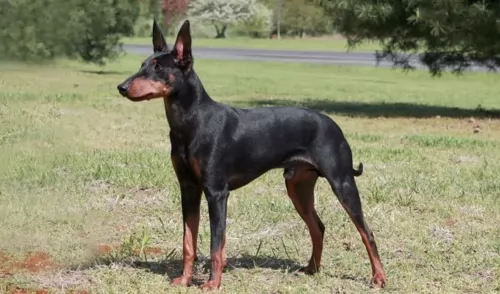 Looking much like the Black and Tan Terrier, the Manchester Terrier is a dog that was actually developed from the Black and Tan, which is the oldest known breed of terrier.
Looking much like the Black and Tan Terrier, the Manchester Terrier is a dog that was actually developed from the Black and Tan, which is the oldest known breed of terrier.
In the United States there are 2 varieties of the Manchester Terrier — the Toy and the Standard but in the UK the 2 sizes are classified as different breeds - the English Toy Terrier and the Manchester Terrier.
The dog was first bred in the 19th century to wipe out rats and mice, originating from Manchester, England. This is an old dog breed, gaining the nickname of the Gentleman's Terrier because of its dignified looks and personality.
After the 2nd World War, the numbers of the dog dropped and this spurred the kennel club to list it as a vulnerable native breed, in danger of extinction. It was in 1937 that the British Manchester Terrier Club was formed.
 A first-generation Chiweenie can look like either of the breeds they are crossed with. However, the second and third generations will have the hybrid look for the most part. No two will look exactly alike however. They have a thin snout that is long on a small, domed head. They can have floppy or pointed ears, eyes that are large and expressive, a moderate tail and small feet. They can vary substantially in their appearances.
A first-generation Chiweenie can look like either of the breeds they are crossed with. However, the second and third generations will have the hybrid look for the most part. No two will look exactly alike however. They have a thin snout that is long on a small, domed head. They can have floppy or pointed ears, eyes that are large and expressive, a moderate tail and small feet. They can vary substantially in their appearances.
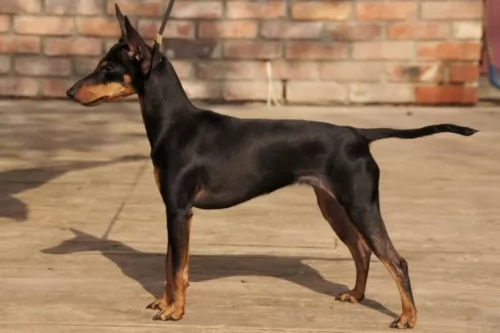 The Manchester Terrier is a small, smooth haired dog with a black and tan coat and a head with a fairly long muzzle, small bright eyes, largish erect ears and a deep chest.
The Manchester Terrier is a small, smooth haired dog with a black and tan coat and a head with a fairly long muzzle, small bright eyes, largish erect ears and a deep chest.
The body is lean and muscular and the tail, where once docked, now tends to be left long. In the toy sized dog you will find him standing at roughly 25 – 30cm in height and he will weigh between 2 to 4kg. The standard sized dog will be slightly taller and heavier and weigh in the region of 8kg.
You can expect between 2 – 4 puppies from a breeding pair.
Feisty, energetic, alert and intelligent are some of the words which describe the Manchester Terrier. Like any other dog, training and socialization will make him a splendid pet, obedient and amicable among people.
He is loving and loyal, courageous and feisty and guaranteed to make you an eager-to-please pet. He can adapt to life in the city or countryside, but is going to need plenty of exercise wherever you keep him as a pet.
 This is an extremely popular hybrid or designer dog because they are so friendly, gentle, loving lapdogs. In addition, they love to play and cuddle. They are great for single or older people. If they live with a family it should be with older kids because younger kids might hurt them. Be careful how rough you play. They are small and can be hurt easily.
This is an extremely popular hybrid or designer dog because they are so friendly, gentle, loving lapdogs. In addition, they love to play and cuddle. They are great for single or older people. If they live with a family it should be with older kids because younger kids might hurt them. Be careful how rough you play. They are small and can be hurt easily.
The Chiweenie is dedicated to their people and extremely loyal. They are also very cautious and can be nervous. They are always watching what else is happening in their environment and they will bark to alert you if they think there is something or someone out of place. They are not quiet dogs. They are great with other small dogs that they are raised with or used to but not with larger dogs, cats or other animals. They are jealous and protective. Train them out of or to avoid resource guarding. They can be stubborn about these things.
They will play constantly if you let them and they are great travel companions, although noises and activity around them does often annoy them. They are also courageous, clever, lovable and happy. Like most toy or small dog breeds you might have a difficult time housebreaking them and crate training is recommended.
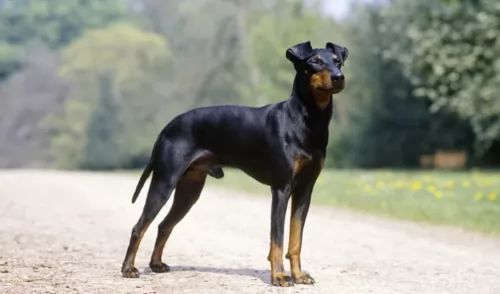 The Manchester Terrier has so many good qualities that make him such a good pet. Low maintenance, he is clean and well groomed to look at. He is also a healthy dog breed, nice and active and low maintenance.
The Manchester Terrier has so many good qualities that make him such a good pet. Low maintenance, he is clean and well groomed to look at. He is also a healthy dog breed, nice and active and low maintenance.
This little dog is willing to come into your home and heart. He will make you a wonderful pet and friend for as long as 15 years if you take special care of him.
 Chiweenies are a pretty healthy crossbreed with their most prominent issue being allergies. At the same time this hybrid might inherit any of the problems of either of their two parental breeds. These conditions might include:
Chiweenies are a pretty healthy crossbreed with their most prominent issue being allergies. At the same time this hybrid might inherit any of the problems of either of their two parental breeds. These conditions might include:
The tendency for this would come from the Chihuahua parental genes and can result in brain damage but normally is not that bad.
The tendency for this would come from the Dachshund parental genes and if your Chiweenie has a long back you will need to be careful of jump and overzealous playing.
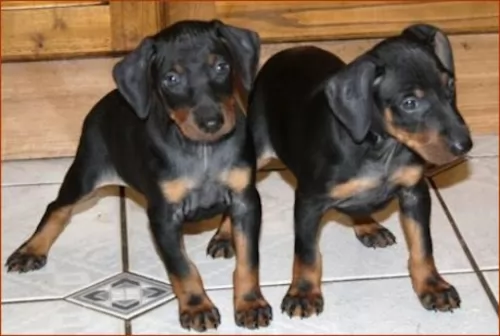 This dog breed is fairly healthy and can reach a good age if looked after well. Every dog though, can be affected by a number of inheritable genetic disorders.
This dog breed is fairly healthy and can reach a good age if looked after well. Every dog though, can be affected by a number of inheritable genetic disorders.
Glaucoma is a common genetic condition in Terrier breeds, including the Manchester Terrier. Secondary glaucoma, which is known as lens luxation is brought about when there is excessive pressure in the eyeball. The lens of the eye is put out of alignment. Most times surgery is the solution.
Von Willebrand's Disease is a blood disorder that affects the clotting process. A dog with this disease will have bleeding gums, continuous bleeding after surgery and sometimes blood in the stool. It’s a disease which can’t be cured but it can be managed with treatments.
 Chiweenies regulate their own food intake, even as puppies. They should be fed twice a day and they are prone to dental issues. Dry food is absolutely recommended.
Chiweenies regulate their own food intake, even as puppies. They should be fed twice a day and they are prone to dental issues. Dry food is absolutely recommended.
In addition to the conditions listed above, the Chiweenie might inherit the issues that affect small dogs most often. This includes:
A sudden drop in blood sugar levels. This can happen if the dog has diabetes and it is unregulated or stress and poor nutrition can also cause it.
These are little dogs with a lot of energy and they burn up a lot of energy. They need to walk every day or have a full-blown play session in the house. They don’t need much space to play in.
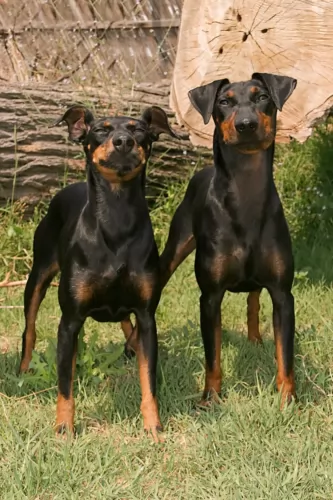 Low maintenance, the Manchester Terrier will only require a brushing once or twice a week. Check his eyes and ears for infections, clip his nails and brush his teeth 2 or 3 times a week.
Low maintenance, the Manchester Terrier will only require a brushing once or twice a week. Check his eyes and ears for infections, clip his nails and brush his teeth 2 or 3 times a week.
The Manchester Terrier is a lean, muscular dog and you want to be sure to keep him that way. If you feed him commercially manufactured food, make sure that it is one of the high quality brands – food which is packed full of vitamins and minerals to ensure the health of your dog.
Any packaged food you buy should be appropriate to the dog’s age and his activity levels. You won’t be doing your dog a favor by feeding him treats that you enjoy such as chocolate, coffee, peanuts, raisins, grapes and onions.
Dogs want simple food that don’t change much. Keeping things simple prevents upset stomachs. Give him some wholesome home-made food occasionally to add into his dry kibble. This can be boiled chicken, brown rice or pasta and some cooked or raw vegetables such as potatoes, carrots and spinach. Some raw meat added in from time to time can also do wonders for your dog. Make sure he has access around the clock to fresh, cool water.
The Manchester Terrier wants lots of exercise, and apart from him having his regular daily walks, he will need runs off the leash in the park. If you go cycling for instance, he will readily run beside you.